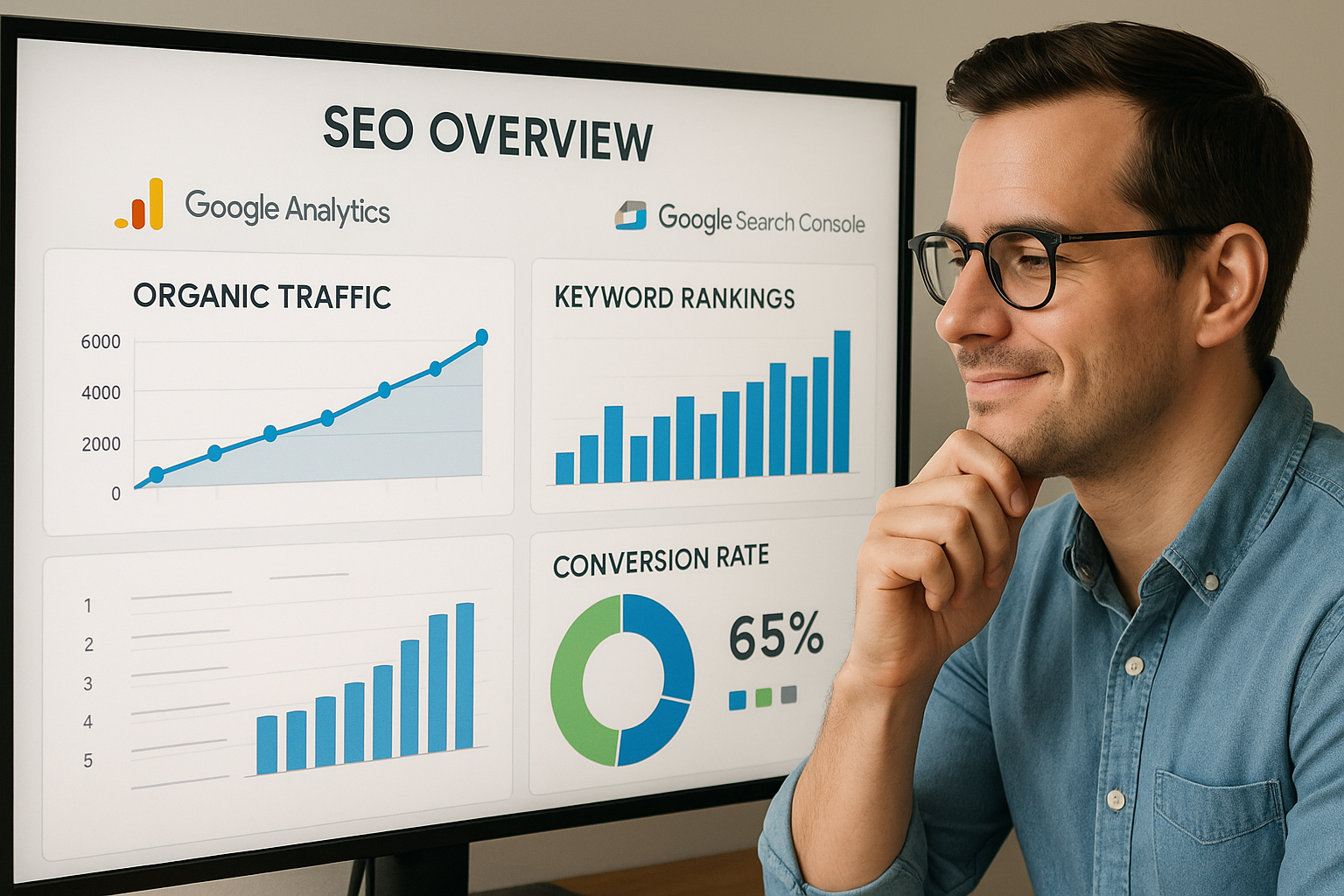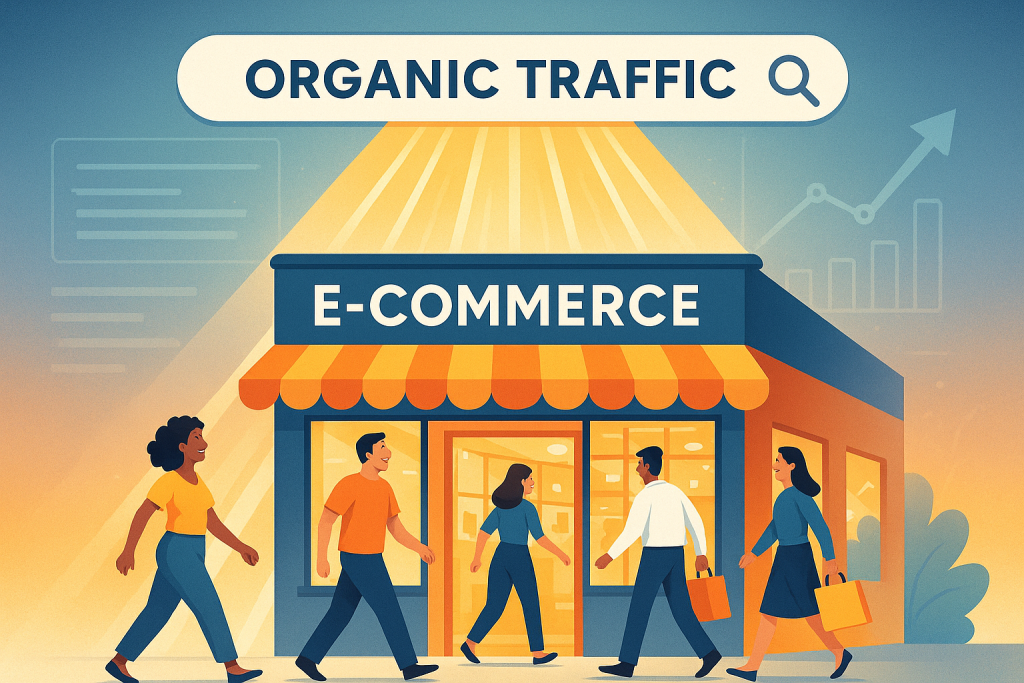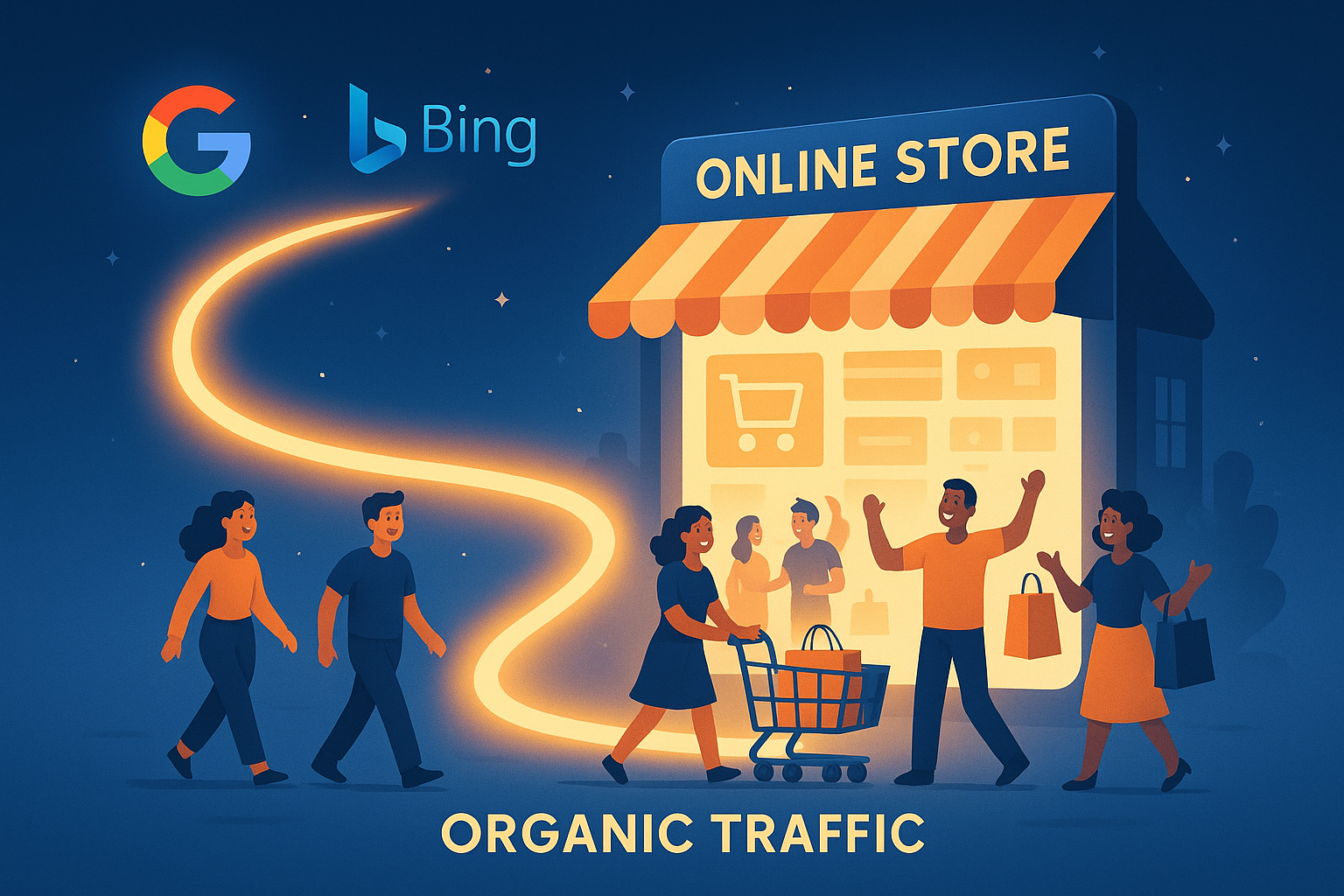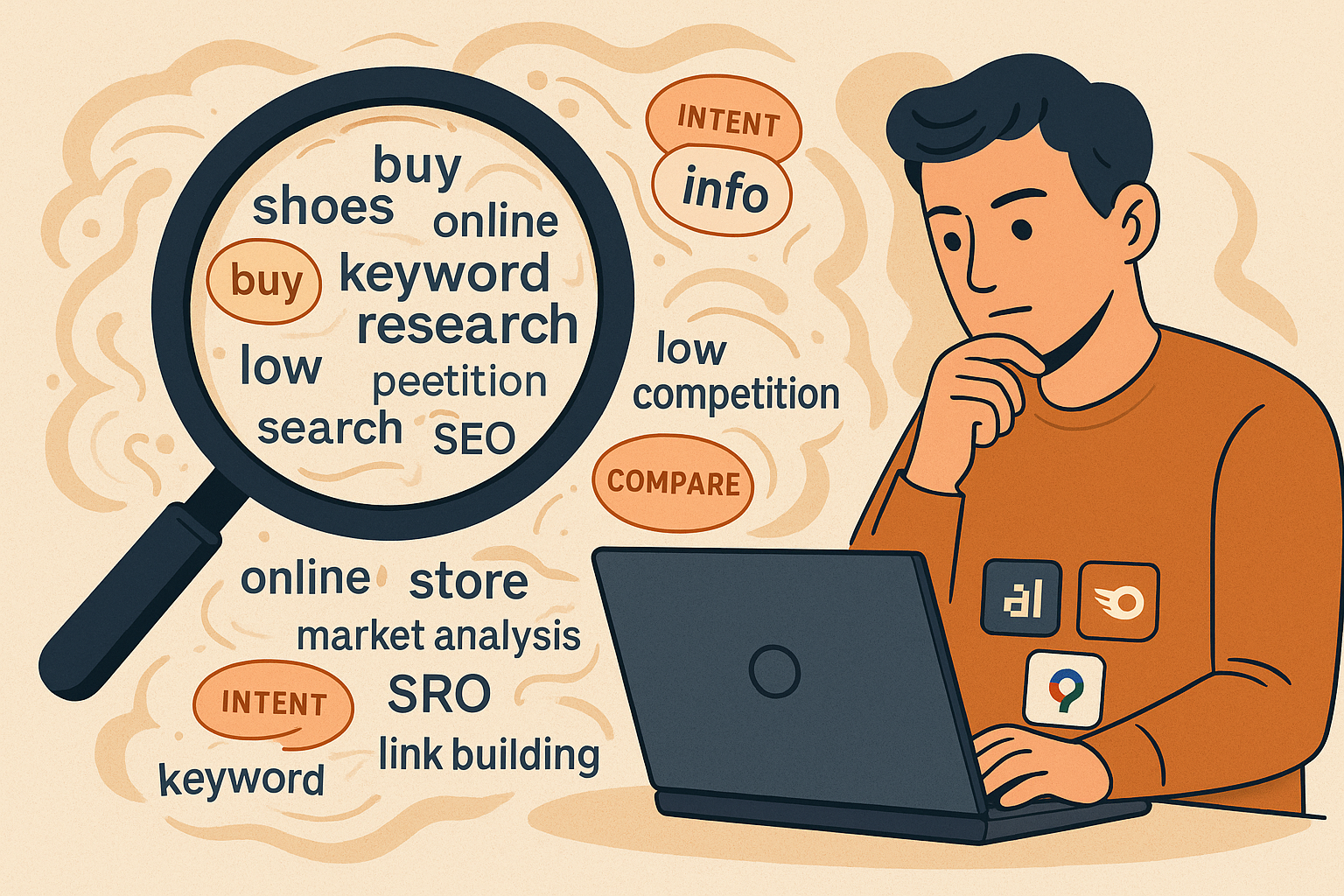Struggling to make your e-commerce store visible online? SEO for e-commerce is the solution. In this article, you’ll learn how to optimize your site for search engines, from keyword research to on-page tactics, so you can drive more organic traffic and boost your sales.
Key Takeaways
- E-commerce SEO is an ongoing strategy requiring consistent optimization and updates to drive organic traffic and enhance visibility on search engines.
- Effective keyword research, on-page optimization, and quality backlinks are crucial components that significantly boost e-commerce site rankings and conversions.
- Technical SEO, mobile optimization, and content marketing are essential practices that enhance user experience, improve credibility, and attract potential customers.
What is SEO for E-commerce?
SEO for e-commerce involves optimizing a website to align with search engine best practices to enhance its visibility on search engine results pages (SERPs). The primary goal of e-commerce SEO is to drive organic traffic by making your online store more discoverable for potential customers searching for relevant products. This process involves a range of techniques, from technical SEO to content optimization, all aimed at improving your site’s ranking without incurring costs per click, including search engine optimization and SEO e commerce efforts.
SEO for e-commerce is not a one-time effort but an ongoing strategy. Regular updates and continuous improvement are necessary to maintain and enhance your site’s visibility. This dynamic nature of SEO requires staying informed about the latest best practices and trends for long-term success.
Key Components of E-commerce SEO
Several key components are crucial for effective e-commerce SEO, including successful ecommerce seo strategies:
- Keyword optimization is the first step.
- Identify and strategically integrate primary or target keywords into product titles, headers, and meta descriptions to enhance relevance and visibility.
- Use ecommerce seo tools like Shopify Magic to help generate optimized product descriptions that incorporate these keywords.
On-page optimization is another vital element. This includes:
- Optimizing individual product pages and listings to be search engine friendly
- Generously using relevant keywords throughout the page, particularly in titles and meta descriptions, to significantly boost SEO performance
- Creating a well-structured site architecture that enhances user experience and facilitates easy navigation, benefiting both users and search engines.
Internal linking and breadcrumb navigation also play crucial roles. Internal links strengthen keyword relevance, improve site navigation, and distribute authority throughout the site. Breadcrumb navigation helps users and search engines navigate the site more efficiently, aiding in better indexation and ranking.
Importance of SEO for E-commerce Websites
SEO is the cornerstone of driving traffic to e-commerce websites. Employing effective SEO practices enhances your site’s visibility, making it easier for potential customers to discover your products. Increased visibility attracts new customers, driving more traffic to your site. Higher search result rankings naturally lead to more customers, resulting in better conversion rates and increased sales.
The ultimate goal of SEO for ecommerce store is to achieve high rankings on search engines like Google. Higher search result rankings can lead to increased organic traffic, which is often more valuable than traffic from paid ads. Customers tend to view organic search results as more trustworthy, enhancing your brand’s credibility and customer confidence.
Benefits of High Search Engine Rankings
High search engine rankings are a game-changer for e-commerce businesses. Studies show that first-page search results attract about 75% of users, underscoring the importance of rankings in visibility. High rankings offer several benefits:
- Increase visibility
- Build trust and credibility
- Customers tend to view organic search results as more reliable than paid ads, enhancing trust in your brand.
High rankings can significantly boost conversion rates. Searchers using transactional and commercial keywords are more likely to buy products, improving sales opportunities. Video content also plays a crucial role, with 76% of consumers likely to purchase after watching a video, making it a powerful engagement tool.
High search engine rankings drive both visibility and conversions, making search optimization indispensable for e-commerce success.
Cost-Effectiveness of Organic Traffic
SEO is highly cost-effective compared to paid advertising. It represents a one-time investment with enduring benefits, unlike the continuous costs of pay-per-click (PPC) campaigns. The long-term impact of SEO provides lasting advantages without ongoing spending, making it a more sustainable option for driving traffic in a successful seo campaign.
Organic traffic reduces long-term marketing costs and ensures steady, sustainable growth for e-commerce businesses. The top search result on Google garners 27.6% of the traffic, illustrating SEO’s vital role in attracting visitors.
For example, 77% of sales for TheBattery.com originate from organic traffic, highlighting its effectiveness in driving revenue. Investing in SEO is a smart and cost-effective strategy for e-commerce success.
Conducting Effective Keyword Research
Effective keyword research is the foundation of a successful SEO strategy. Understanding search intent reveals what users are seeking during online searches and helps identify relevant search terms and related keywords, including informational keywords and informational keyword intent keyword ideas. Different types of keywords, such as head terms and primary keyword long-tail keywords, play distinct roles in SEO. Long-tail keywords, being more specific, often lead to higher conversion rates and can be influenced by the user’s keyword intent search query.
Effective keyword research involves using various tools and strategies. Google autocomplete, analyzing competitor keywords, and understanding consumer behavior are essential components. Aligning your SEO strategy with user intent drives qualified traffic and improves conversion rates, making ecommerce keyword research critical for e-commerce SEO. To succeed, it is important to perform keyword research effectively.
Read in our previous article:
Hire Magento Programmers: Certified Experts for E-commerce Success
Tools for E-commerce Keyword Research
Leveraging the right tools is essential for effective keyword research. Popular tools like Ahrefs, Semrush, and Ubersuggest help identify potential high-value keywords that can drive traffic to your site. Google Keyword Planner provides search estimates and competition analysis, helping you discover new keywords.
Google Search Console reveals low-competition keywords with high potential for driving traffic. Combining these tools with Google’s autocomplete and competitor analysis can uncover new keyword opportunities. Long-tail keywords, which tend to have lower competition, are particularly beneficial for e-commerce websites as they often result in higher conversion rates. A long tail keyword can help in targeting specific audiences effectively.
Analyzing Competitor Keywords
Analyzing competitor keywords enhances your SEO efforts. Tools like Semrush and Ahrefs allow you to enter a competitor’s domain and find relevant keywords they are targeting. For instance, checking the ‘Positions’ tab in Semrush can reveal the exact ranking keywords your competitors are using.
This analysis reveals opportunities for your content strategy and provides insights into competitors’ SEO performance. Understanding domain authority, which affects search engine rankings beyond just keyword matching, is also crucial.
Uncovering your competitors’ keyword strategies helps identify gaps and opportunities to strengthen your own SEO efforts.
On-Page SEO Strategies for E-commerce Sites

Optimizing web pages involves:
- Using titles, meta descriptions, content, and images effectively.
- Utilizing breadcrumbs to aid in navigation and help search engines crawl the website more effectively.
- Addressing content duplication issues by creating unique content or using canonical tags.
The best strategy to prevent duplicate content is to write unique descriptions for all products.
Optimizing Product Pages
Optimizing product pages is a key aspect of e-commerce SEO. Title tags, which help Google understand a page’s topic, should be concise and include primary keywords at the beginning to promote relevance and improve ranking chances. The recommended character limit for title tags is under 60 characters. Tags and meta descriptions, providing a short description below the title tag, are crucial for attracting user clicks and should be catchy and informative.
Images play a significant role in SEO. E-commerce sites should consider the following for better results:
- Use unique images instead of stock images.
- Optimize images with relevant keywords in file names.
- Include image alt text to help increase visibility in Google image results.
Incorporating relevant keywords and subheadings in product pages aids SEO. Using headings for product descriptions and delivery information as H2s further improves structure.
Improving Category Pages
Category pages are equally important for SEO success. Key points include:
- Using categories that map to high-value keywords can significantly enhance SEO performance.
- Keyword-rich subfolders help create a better URL structure, aiding in search engine indexing.
- Internal linking within category pages enhances the strategy and distributes page authority effectively.
Including the target keyword verbatim in internal link anchor text improves SEO. Using conversational language in category page body copy makes the content more approachable and engaging. However, be cautious of keyword stuffing.
Category page introductions should be at least 300 words long, with natural keyword inclusion to boost relevance and rankings.
Technical SEO Essentials
Technical SEO is crucial for optimizing site structure and performance, directly impacting search engine rankings. E-commerce websites frequently face common technical issues, such as slow loading times and the absence of a secure SSL certificate. Sitemaps guide search engines through a website’s architecture, enabling efficient content discovery and indexation.
Effective site architecture minimizes navigation barriers, enhancing user experience and supporting better search engine crawling. Regular maintenance transforms technical upkeep into preventive care, safeguarding revenue from potential technical faults. Addressing these technical aspects ensures a smooth, user-friendly experience, crucial for SEO success, especially when considering ecommerce site architecture.
Read in our previous article:
Top Magento Enterprise Developers: Elevate Your eCommerce Strategy
Enhancing Site Speed
Improving site speed is paramount for reducing bounce rates and enhancing user experience. A delay of just one second can significantly increase the likelihood of users leaving your site. Tools and techniques to improve site speed include:
- Tools like Google’s Page Speed Insights and GTmetrix to check website performance and identify areas for improvement.
- Compressing product photos.
- Limiting homepage products to five.
- Simplifying navigation.
These methods can effectively reduce visitor abandonment related to speed.
Using a Content Delivery Network (CDN), which stores copies of web pages on servers closer to users, reduces loading times. Additionally, minification – removing unnecessary characters and spaces from code—helps improve page speed.
Optimizing Core Web Vitals, a set of user experience metrics, enhances loading times, providing a better experience for users and improving SEO performance.
Mobile Optimization
With the majority of searches now occurring on mobile devices, mobile usability is a critical factor for SEO success. Google recommends using responsive web designs to ensure your ecommerce websites are mobile-friendly while searching online. This approach adapts the layout to different screen sizes, providing an optimal viewing experience across all devices, following seo best practices.
Prioritizing mobile optimization attracts more organic traffic and improves your search engine rankings.
Secure URLs and HTTPS
Using HTTPS is crucial for e-commerce websites as it encrypts user data, enhancing security and trust. The purpose of HTTPS is to secure connections and protect data from being intercepted, which is especially important for online transactions. Customers are more likely to trust and engage with sites that display the lock icon in the address bar, indicating a secure connection.
Additionally, you can choose optional security features like third-party TLS certificates or extended verification for added protection. By ensuring your site is secure, you not only protect your customers’ data but also improve your search engine rankings, as Google considers HTTPS a ranking factor.
Building Quality Backlinks
Quality backlinks from reputable sources significantly enhance the authority and search ranking of an e-commerce site. Key points include:
- Consistent outreach and relationship-building with relevant sites can yield valuable backlink opportunities, strengthening your SEO efforts.
- High-quality links from high-authority websites enhance the credibility of your e-commerce site.
- These backlinks make your site more trustworthy in the eyes of search engines.
To build these backlinks, focus on creating valuable content that other sites would want to link to. Engaging in strategies like influencer outreach and guest blogging can also help acquire quality backlinks, further boosting your search engine rankings.
Leveraging Influencer Partnerships
Collaborating with influencers is a powerful strategy for building online visibility and authority. Influencer outreach can lead to the creation of valuable content that encourages them to link back to your site, enhancing search rankings and expanding your reach.
E-commerce sellers can also request links as official resellers from their suppliers or distributors to improve link building and backlinks. Pitching stories to reporters after signing up for Help a B2B Writer is another method for gaining backlinks through press mentions.
Influencer partnerships not only improve backlinks but also increase brand visibility, driving more traffic to e-commerce sites.
Guest Blogging
Guest blogging is an effective way to build backlinks and establish authority in your niche. By creating relevant content for other websites, you can earn valuable backlinks that boost your SEO. Prioritizing high-quality and relevant sites for guest posts ensures effective backlink acquisition.
Building relationships and adding value through content collaboration is a key benefit of guest posting. When creating content for guest posts, focus on quality, insight, and relevance to maximize the impact on your SEO efforts.
Content Marketing for E-commerce SEO
Content marketing is a powerful tool for enhancing e-commerce SEO. By promoting your brand and providing valuable information to consumers, content marketing can significantly improve search engine rankings and drive traffic to your site. Effective content marketing strategies include creating buying guides, detailed blog posts, and using various content types like videos, blogs, and newsletters.
Sharing content on social media diversifies traffic sources and boosts brand awareness. Engaging with influencers and promoting blog content through email lists can further increase visibility and conversions for ecommerce businesses.
Overall, content marketing lays the foundation for a durable online presence and steady organic traffic growth.
Creating Informative Blog Posts
Adding a blog to an e-commerce website helps rank for relevant keywords and attract motivated users. Blog posts should balance promotional content with informative posts that address readers’ problems, providing value and building trust. Targeting the right audience in blog content is crucial for addressing customer queries effectively and driving conversions.
Optimizing blog posts for commercial keyword intent and transactional keywords, especially for customers close to making a purchase, can enhance SEO performance. By creating informative and engaging blog content, you can improve your site’s visibility and attract a steady stream of potential customers.
Utilizing Video Content
Visual storytelling through videos is known to yield the highest return on investment in content marketing. Videos can engage users, convey complex information effectively, and boost conversion rates.
By incorporating video content into your marketing strategy, you can enhance user engagement, improve SEO performance, and drive more traffic to your e-commerce site.
Monitoring and Analyzing SEO Performance

- Organic traffic volume
- Top landing pages
- Average engagement time
- Conversion events
User experience metrics, such as bounce rate and time on page, significantly influence how search engines rank e-commerce sites.
Monitoring incremental improvements in search visibility indicates successful optimization efforts. By regularly analyzing these metrics, you can make informed adjustments to your SEO strategy, ensuring sustained growth and improved search engine rankings.
Using Google Search Console
Google Search Console provides valuable insights on indexing issues and organic traffic trends, essential for improving site performance. Submitting your sitemap to Google Search Console alerts the system to all critical pages, enhancing visibility in search rankings. This tool also helps identify and fix indexing issues, ensuring your site is fully optimized for search engines.
By leveraging the data and insights from Google Search Console, you can track your SEO performance, identify areas for improvement, and make data-driven decisions to enhance your site’s visibility and rankings.
Tracking Metrics with Google Analytics
Google Analytics monitors website traffic, user behavior, and conversions, providing a comprehensive view of your site’s performance. Tools like Ahrefs and Google Analytics can be used to monitor key SEO performance metrics, helping you understand how website visitors interact with your site. User engagement metrics, such as bounce rate and time on page, provide signals of visitor value to search engines.
Analyzing user engagement and behavior through Google Analytics informs adjustments to enhance conversion rates. By regularly reviewing these metrics, you can optimize your SEO strategy for better performance and sustained growth.
Summary
In summary, mastering SEO for e-commerce is a multifaceted endeavor that requires a strategic approach and continuous effort. From understanding the basics of e-commerce SEO to implementing advanced techniques like keyword research, on-page optimization, technical SEO, and content marketing, each component plays a vital role in driving organic traffic and improving search engine rankings. The benefits of high search engine rankings and cost-effective organic traffic underscore the importance of investing in a robust SEO strategy.
By leveraging tools like Google Search Console and Google Analytics, you can monitor and analyze your SEO performance, making informed adjustments to enhance visibility and drive conversions. As you implement these strategies, remember that SEO is an ongoing process that requires regular updates and optimization. With perseverance and a well-rounded approach, you can achieve e-commerce success and turn your online store into a thriving business.
Frequently Asked Questions
What is e-commerce SEO?
E-commerce SEO is essential for boosting your online store’s visibility and driving organic traffic through search engines. By optimizing your site effectively, you can reach more customers and increase sales!
Why is SEO important for e-commerce websites?
SEO is essential for e-commerce websites because it boosts visibility and attracts new customers, resulting in higher traffic and sales. Embrace SEO to unlock your business’s full potential!
What are the key components of e-commerce SEO?
To succeed in e-commerce SEO, focus on keyword optimization, on-page enhancements, a solid site structure, effective internal linking, and technical SEO. Master these components, and watch your online presence soar!
How can I improve the speed of my e-commerce site?
To boost your e-commerce site’s speed, focus on compressing images, utilizing a CDN, and minifying your code. By implementing these strategies, you’ll provide a faster, more efficient shopping experience for your customers!
What tools can I use for keyword research?
You can supercharge your keyword research using tools like Ahrefs, Semrush, Ubersuggest, Google Keyword Planner, and Google Search Console. Each of these options can help you uncover valuable keywords for your content strategy!









